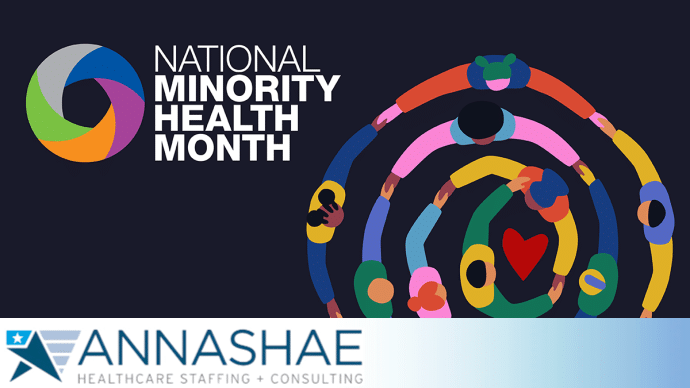
16 Apr National Minority Health Month 2025: A Call to Action to Realize Health Equity and Stop Disparity
The month of April, National Minority Health Month, serves as an important reminder for healthcare professionals to focus intently on improving health outcomes for all individuals, regardless of their background or socioeconomic status. Health-related disparities significantly impact the lives of minority populations across our nation, leading to unequal access to quality care and resources. We must address these disparities to ensure equity in healthcare for everyone.
Defining Health Disparities
Health disparities refer to preventable differences in health outcomes that occur due to social, economic, and environmental disadvantages. Minority groups often bear a disproportionate burden of these disparities because they face barriers that hinder their ability to obtain quality healthcare. Barriers can include lack of insurance, limited access to health services, cultural and language differences, and biases within healthcare systems.
This year, National Minority Health Month focuses on understanding specific health challenges faced by various minority communities and taking actionable steps toward promoting health equity. Healthcare professionals, policymakers, and community leaders can collaborate to design strategies for fostering inclusive and accessible healthcare services based on these five steps.
Health Disparities among Minority Populations

According to the American Heart Association, these examples of health disparities are a reality in the US:
• African Americans have a 33 percent higher death rate from cardiovascular disease than any other group.
• African Americans are twice as likely to have a stroke.
• 36 percent of Native Americans die early from heart disease (before age 65) compared to 17 percent of the overall U.S. population.
• Mexican Americans, African Americans, Native Americans, and Alaskan Natives have a much higher prevalence of type 2 diabetes.
• African American and Mexican American women have a much higher rate of obesity.
By recognizing the underlying causes and implications of these disparities, we can work toward creating a more equitable healthcare system that ensures everyone can get the resources they need for better health outcomes.
Steps Toward Achieving Health Equity
Disparities in health outcomes can lead to increased suffering and loss of life, as well as economic burdens on families and society as a whole. Promoting health equity creates a more just and fair healthcare system that addresses the unique needs of diverse populations.
Ensuring equitable access to healthcare resources and support not only uplifts marginalized communities but also contributes to the overall well-being of the population. To begin, healthcare leaders in systems and hospitals can take these five steps within their organizations to promote health equity and improve health outcomes:
1. Enhance Awareness and Education: Providing education about health disparities and their effects is a vital step in addressing this issue. Community outreach programs play a crucial role in informing individuals about the available health services and encouraging preventative care. Improve Healthcare Access: In many minority communities, healthcare facilities are often scarce or under-resourced. Expanding access through telehealth, mobile clinics, and community health worker initiatives can ensure that individuals receive the care they need.
2. Improve Healthcare Access: In many minority communities, healthcare facilities are often scarce or under-resourced. Expanding access through telehealth, mobile clinics, and community health worker initiatives can ensure that individuals can get the care they need.
3. Cultural Competence Training: Healthcare providers must receive training to understand and navigate cultural differences effectively. This training can help eliminate stereotypes and biases, improve patient-provider communication, and improve health outcomes.
4. Policy Advocacy: Advocacy is essential in driving change. Individuals and organizations must engage with policymakers to address the social determinants of health that contribute to disparities. Supporting legislation that promotes health equity is also an effective means of advocacy.
5. Community Engagement: Empowering communities to take the lead in addressing their unique health needs can yield transformative results. Initiatives that involve community members in proposing solutions to local health issues are also more likely to be effective.
What Can You Do for National Minority Health Month?
As we recognize National Minority Health Month, let us commit to taking meaningful action against health disparities. The path to health equity requires us to acknowledge the challenges that minority groups face and create systems that support inclusive health and well-being. Health equity is essential because it ensures that all individuals, regardless of their socioeconomic status, race, ethnicity, or geographic location, have the opportunity to attain the best health outcomes.
Annashae Staffing helps hospitals and healthcare systems promote diversity and equity by representing candidates from distinct backgrounds with a wide range of specialties in urban, suburban, and rural areas around the country. Contact Annashae today for all your healthcare staffing needs.




